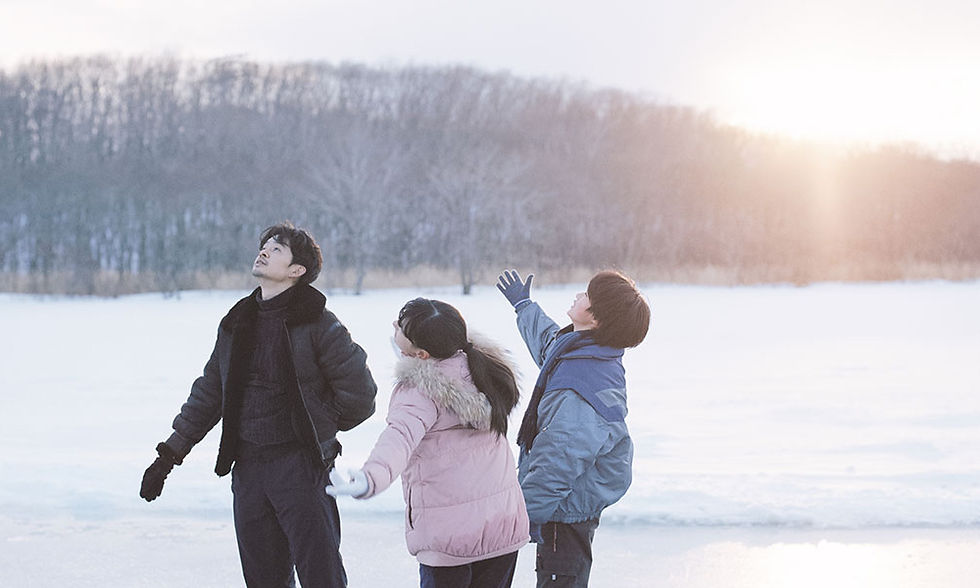'My Sunshine' review: Don't let the darkness of one's ignorance block out the light | TIFF 2024
- S.J.
- Sep 22, 2024
- 3 min read
Updated: Sep 25, 2024

Today, we're wilfully getting blinded by My Sunshine (ぼくのお日さま in Japanese), a gentle drama with plenty of coming-of-age and sports elements. In a snowy island town in winter, we come across a tween boy named Takuya (Koshiyama Keitatsu) who's gearing up for another hockey season as is typical for boys living there. However, Takuya isn't all that keen on said sport and is instead more engrossed when watching Sakura (Nakanishi Kiara), a talented figure skater of similar age, practice at the same rink. Sakura's coach and former figure skater Arakawa (Ikematsu Sōsuke) notices Takuya's interest in Sakura and the sport, and begins to coach the two kids as an ice dancing duo. Eventually, personal resentments threaten to torpedo their harmonious movements.
Directed, written, photographed and co-edited by Okuyama Hiroshi, My Sunshine begins with an unassuming frequency guiding the storytelling and action on screen, almost bordering on fairytale-esque presentation. But as it goes on, Okuyama's quiet, thoughtful story composes new notes and introduces a naive romantic angle that we follow from Takuya's POV as he seems to be navigating more mature feelings or realisations for the first time, while Arakawa's arc presents him as a trusted mentor with a serious relationship with his boyfriend Igarashi (Wakaba Ryûya), something that becomes a ''Chekhov's weapon'' when we see Sakura express archaic views in regard to gender (this is a period piece, to be clear) whilst being somewhat unhappy about being paired up with Takuya. In a more straightforward movie, we'd expect a nice childhood romance but here competitiveness and narrow-mindedness might be overshadowing it altogether.
Overshadowing is a slightly ironic term since the scenes themselves are remarkably lit by lighting designer Nishigaya Hiroki and Okuyama. Scenes outside obviously use the natural bounce coming from snow but the scenes at the rink become increasingly more ethereal as the young skaters continue to improve in their craft, therefore it makes sense that the craft of filmmaking itself also would reflect that. The helmer supports that winter wonderland feeling with a static camera when everyday life is happening, and dancing with it whenever we're on the ice or characters are experiencing something new.
Succumbing to that wonderland ambience requires you putting your own heart on the line a little bit so you can care about the characters' dreams and relationships, but that's very easy to do thanks to the main cast. Koshiyama depicts Takuya's openness and innocence very believably in his rather understated outing; you understand Sakura's tunnel vision and determination when you see Nakanishi in skating scenes and wishing for further guidance; and Ikematsu brings a lovely level of warmth to this cold environment, allowing these youngsters to explore their developing feelings about themselves or the world. All three of them together are an interesting bunch, which makes for great drama.
All these threads dig into maturation, conviction, trust and learned values, ultimately leading to the conflict in the form of small bursts of homophobia that divides the rink into three and changes everyone's trajectory. It's smart in the sense that even a pretty, luminous picture isn't safe from the ugly shadows of ignorance, and that it can be conveyed with disapproving looks, one common adjective or a quiet act of othering, such as claiming that you're not doing it to be mean even though you're only saying that to make yourself feel better. Structurally, however, the film introduces this conflict at an awkward point in the script and the fallout is incredibly scattershot and rushed, made worse by the fact that the following scenes are mere vignettes more or less. It's a strange choice because these scenes seem detached from the movie we were watching before, but in a way that neglects the characters, too.
Some of that disruption is mitigated by the heartfelt touch that Okuyama has as a director. The tone is sweet, the performances pull you in and how the skating itself is choreographed and captured is also pretty fantastic. You expect a moving coming-of-age drama—and you do get that—but you also get a dashing sports film in addition to that with the way that it handles types of people that would be drawn to this sport. This is an intricate, gorgeously lit dance between different personalities that also takes your heart and crushes it ever so slightly when the ice underneath starts to crack and melt away.
Smileys: Lighting, directing, story, Koshiyama Keitatsu
Frowneys: Structure
Will it lift you up or spin out of control?
4.0/5
Where to watch:
This article may contain affiliate links, which means that we may earn a commission if you make a purchase through these links. Thank you for the support!










